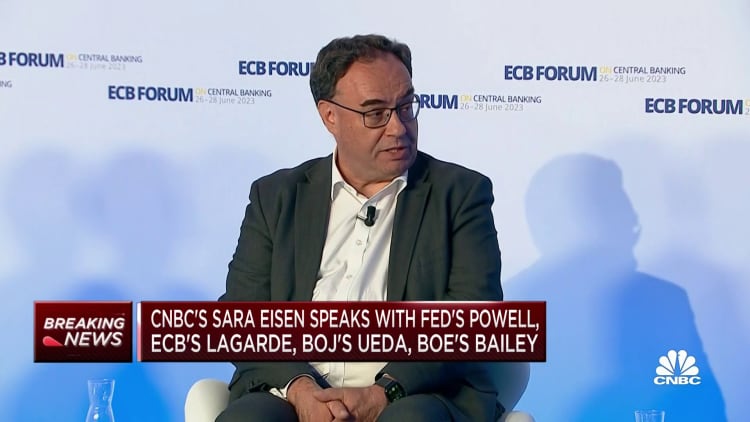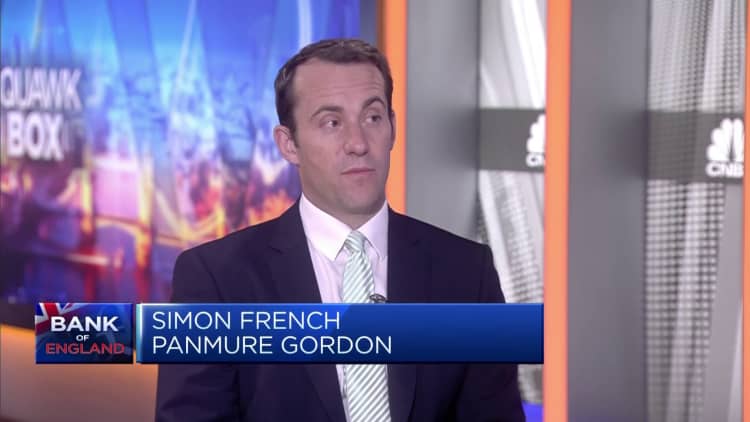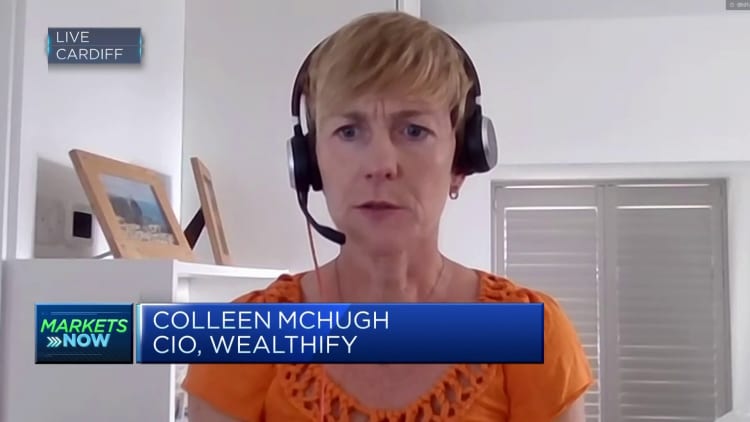LONDON — British workers are getting substantial pay raises, despite desperate pleas from the government and the Bank of England, both of which blame high wage growth in part for the country's inflation problem.
U.K. wages excluding bonuses grew by 7.3% in the three months to May, when compared to the same period last year, the Office for National Statistics revealed on Tuesday.
Both Bank of England Governor Andrew Bailey and U.K. Finance Minister Jeremy Hunt on Monday told an audience in the City of London that high wage settlements were harming their efforts to contain inflation.
U.K. headline consumer price inflation hit an annual 8.7% in May, unchanged from the previous month but well above the Bank's 2% target. More worryingly for policymakers, core inflation — which excludes volatile energy, food, alcohol and tobacco prices — rose to 7.1% year-on-year, the highest rate since March 1992.
"These figures show that workers are still managing to secure hefty wage rises despite the apparent cooling in the labour market as a whole, possibly reflecting attempts by companies to prevent skilled workers from leaving, but also suggestive that the softening market the headline numbers are suggesting may not be being seen on the ground," said Stuart Cole, chief macro economist at Equiti Capital.
"The BoE has repeatedly warned that high wage growth remains a significant impediment to its efforts to bring inflation lower, and today's figures will do nothing to convince it that the labour market is no longer running hot, leaving it to conclude that monetary policy needs to be tightened further."
Much of the increase in pay has been driven by the private sector, with annual wage growth increasing to 7.6% in the three months to April.

Hunt and Prime Minister Rishi Sunak will decide this month whether to approve pay increases of around 6% for public sector workers, who have been striking across sectors over the last year.
"No one can blame cash-strapped workers asking for a bit more in their pay packets so they can try and keep their living standards in the same ballpark they've become used to," said Danni Hewson, head of financial analysis at AJ Bell.
"And at 7.3% those increases might seem chunky on paper, but in real terms inflation is chomping through those extra pennies and leaving households substantially worse off."
Further tightening to come
The U.K. has been hammered by a cost-of-living crisis over the past 18 months following the inflationary shocks inflicted by the Covid-19 pandemic and Russia's invasion of Ukraine.
However, Bank of England Governor Bailey noted in his Mansion House speech on Monday that the British economy has proven unexpectedly resilient. Although acknowledging that nobody wished to see "unemployment or growth weaker," he said both price and wage rises at current levels are "not consistent with the inflationary target."
The central bank has raised interest rates at 13 consecutive monetary policy meetings as it looks to rein in inflation, most recently implementing a 50 basis point hike last month to take the base rate to 5%. In light of the strong wage data, markets are now pricing around a 64% chance that the Monetary Policy Committee opts for another half-point hike to 5.5% in August.
Deutsche Bank was one of the institutions to upgrade its August forecast to 50 basis points on the back of Tuesday's data, though the German lender retained its terminal rate projection at 5.75% with at least one further quarter-point hike in September.
Senior Economist Sanjay Raja in a note Tuesday said risks to this terminal rate projection are "tilted firmly to the upside," though noted that there are "positive signs brewing in the labour market," at least as far as the central bank is concerned.

Unemployment rose unexpectedly from 3.8% to 4% in the three months to April, while vacancies continued to fall. The employment rate rose to 76% on the back of an increase in part-time employment, while the economic inactivity rate declined from the previous quarter to 20.8%, continuing a recent downward trend.
"Inactivity is continuing to fall. Participation is still rising. The jobless rate is running a little higher than the MPC anticipated back in May, and we're seeing more survey data point to some downside in wage growth and inflation over the coming months," Raja noted, offering some potential solace for the Treasury and the Bank of England.
However, Equiti's Cole cautioned that the boost a rise in unemployment may provide the Bank in its battle to bring CPI under control will "count for very little if hours worked and wages are both simultaneously rising, collectively putting more income into workers' pay packets."
Not a wage spiral
The government and central bank's repeated calls for workers to refrain from demanding pay rises in line with inflation have been met with outrage by unions and large swathes of the British public.
The Bank of England's own annual accounts last week revealed that every senior official apart from Bailey had accepted a base salary increase over the past year.
Last summer saw a slew of strikes and protests as real wages, which reflect the power of a worker's pay after accounting for inflation, declined at a record rate.
Even the bumper increases seen year-on-year in the latest figures have yet to match inflation, meaning workers have continued to feel poorer and demand substantial pay rises, even though the Bank of England expects inflation to fall sharply as cheaper food and tumbling energy prices feed through.
However the shifting balance of supply and demand, along with leading wage indicators, suggest that the "dreaded wage-price spiral" does not look likely as of yet, according to Berenberg Senior Economist Kallum Pickering.
"No question about it, current nominal wage growth remains far too high relative to the sustainable rate of probably around 3.5-4.0% yoy. However, survey-based measures of consumer inflation expectations are plunging rapidly – undermining any serious fear that wages are rising in anticipation of high future inflation and are hence leading price pressures higher," Pickering said in a note Wednesday.

The inflation expectations component of the GfK consumer confidence survey in June fell to its lowest level since the Brexit vote in 2016, while the Bank's own inflation expectations survey in the second quarter indicated that consumers expect inflation to fall to 2.6% over a 12- to 24-month period, in line with the 10-year average and down from 3.4% in the fourth quarter of 2022.
"Although money wages are growing strongly, real wages are still falling yoy. Once inflation falls below nominal wage growth and real incomes begin to recover, money wage gains should decelerate. This would be the normal response of tight labour markets to a real income shock," Pickering said.
"External supply shocks, domestic political uncertainty (including around Brexit), excessive fiscal and monetary policy stimulus and labour shortages have all contributed to excess price pressures in the U.K., but three of these trends have gone into reverse," he added.
Producer prices are estimated to lead inflation by around three months and have normalized as the energy and commodity supply shocks have dissipated, while reduced political uncertainty will support higher "productivity-boosting" investment, Pickering suggested.
"Tight monetary and fiscal policies are now constraining broad money growth – a proxy for demand, which typically leads inflation by around 9-12 months," he said.
"Improving supply combined with moderating demand will sap firms' pricing power and reduce their willingness to bid up wages to attract new workers."

